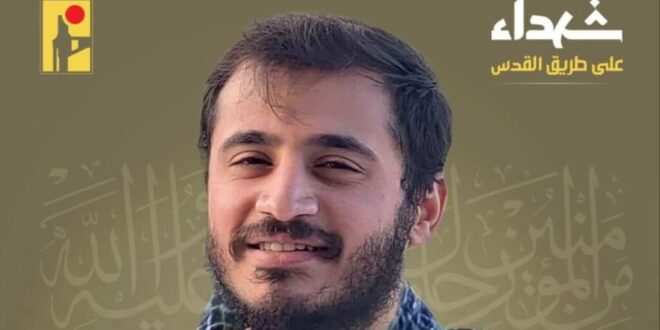Hassan Ali Daqduq, the son of senior Hezbollah commander Musa Ali Daqduq, was killed in a recent Israeli airstrike in Syria’s Quneitra governorate, according to reports. The elder Daqduq was tasked by Iran and Hezbollah to establish militias in Iraq along the lines of Lebanese Hezbollah. He was successful in his efforts and numerous Iranian-backed Iraqi militias are wielding their strength in Iraq and the region.
Three other individuals affiliated with Hezbollah’s “Golan Unit,” which is also known as Syrian Hezbollah, were killed in the same airstrike. FDD’s Long War Journal could not independently verify the authenticity of the reports.
The Golan Unit is led by Hassan’s father, Musa Ali Daqduq. Hassan’s position within the Golan Unit is unknown. In May of 2023, two U.S. intelligence officials told FDD’s Long War Journal that the Golan Unit was training to attack U.S. forces stationed in Syria. Since Hamas’s brutal attack on southern Israel on Oct. 7, Iraq and Syria militias have targeted U.S. bases more than 80 times.
Furthermore, one of the deceased individuals has been identified as Muhammed al-Tamer, a Syrian national and a member of a pro-Assad militia. For the moment, Hezbollah has chosen not to issue an official statement detailing the circumstances surrounding Daqduq’s killing, though the organization did release a statement mourning the fallen fighters.
While the precise details surrounding the demise of Daqduq and his associates remain uncertain, both Syrian and Israeli news outlets have published reports suggesting that a drone attack – presumably Israeli – targeted the vehicle carrying Daqduq and the other fighters.
Following the Oct. 7 Hamas-led terrorist attack on southern Israel, the Israeli military has been engaged in conflict on several fronts. The Jewish state has focused on eliminating Hamas in Gaza but has launched pre-emptive strikes against Hezbollah and Iran’s Islamic Revolutionary Guards Corps (IRGC), which operates in Syria, Lebanon, and Iraq. For example, on Nov. 10, Israeli airstrikes in the Syrian province of Homs killed seven Hezbollah fighters. Separately, on Dec. 2, Israeli strikes in the Damascus area killed two IRGC generals who were reportedly there on an “advisory” mission.
Since Hezbollah began its offensive against Israel in October, the Lebanese group has lost 98 fighters to Israeli strikes, most along the Israeli border with Lebanon, according to a count by FDD’s Long War Journal.
Musa Ali Daqduq and his legacy in Iraq
Musa Ali Daqduq is a U.S.-sanctioned Hezbollah military commander, who played a significant role in forming Iran-backed Shia terror organizations responsible for the murder of American soldiers in Iraq.
According to the U.S. Treasury Department, “In approximately 2005, Iran asked Hezbollah to form a group to train Iraqis to fight Coalition Forces in Iraq. In response, Hassan Nasrallah established a covert Hezbollah unit to train and advise Iraqi militants in Jaish al Mahdi (JAM) [or Mahdi Army] and JAM Special Groups, now known as Asaib Ahl al Haq [League of the Righteous],” a Mahdi Army faction which is a U.S. listed Foreign Terrorist Organization. Asaib Ahl al Haq has emerged as one of the most powerful Shia terror organizations in Iraq today.
Daqduq worked closely with former Islamic Revolutionary Guards Force – Qods Force commander Qassem Soleimani, Abu Mahdi al Muhandis, the former head of Iraq’s Popular Mobilization Forces and the founder of Hezbollah Brigades, and Qais Qazali, the founder and leader of Asaib Ahl al Haq, and Abu Mustafa al Sheibani, the founder of the Sheibani Network and current leader of Kata’ib Sayyid al-Shuhada, to establish a network of militias loyal to Iran.
The U.S. killed Muhandis and Soleimani in an airstrike in Baghdad in 2020.
The Iranian-backed militias that were spawned by Daqduq, Hezbollah and Iran are now powerful entities in Iraq and Syria. In Iraq, the militias wield significant political power in parliament, while the military branches dominate the Popular Mobilization Forces, an official arm of the Iraqi security establishment that reports only to the prime Minister.
In 2007, Daqduq was captured by the U.S. military. After 11 months, he was transferred to Iraqi custody and released in Nov. 2012 after being acquitted of terrorism charges. Following his release in 2012, the U.S. added Daqduq to its list of Specially Designated Global Terrorists. Daqduq soon returned to Lebanon and was placed in charge of training Hezbollah’s special forces.
 Eurasia Press & News
Eurasia Press & News




